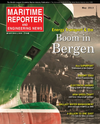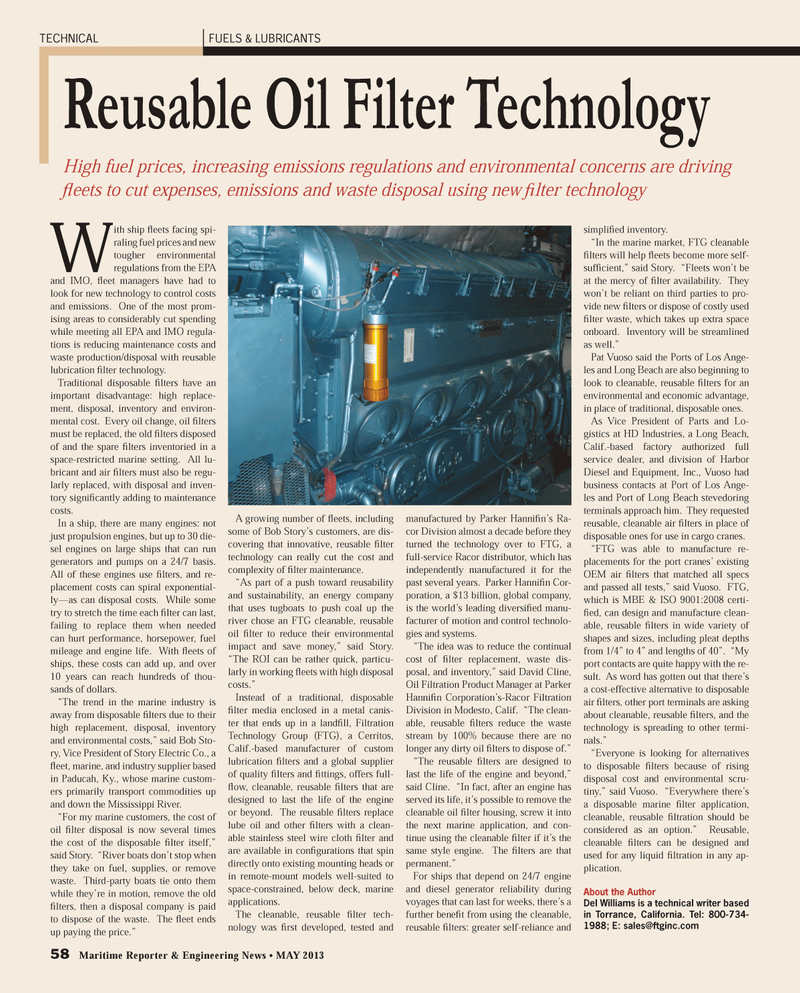
Page 58: of Maritime Reporter Magazine (May 2013)
Energy Production & Transportation
Read this page in Pdf, Flash or Html5 edition of May 2013 Maritime Reporter Magazine
With ship ß eets facing spi- raling fuel prices and new tougher environmental regulations from the EPA and IMO, ß eet managers have had to look for new technology to control costs and emissions. One of the most prom-ising areas to considerably cut spending while meeting all EPA and IMO regula- tions is reducing maintenance costs and waste production/disposal with reusable lubrication Þ lter technology. Traditional disposable Þ lters have an important disadvantage: high replace-ment, disposal, inventory and environ-mental cost. Every oil change, oil Þ lters must be replaced, the old Þ lters disposed of and the spare Þ lters inventoried in a space-restricted marine setting. All lu- bricant and air Þ lters must also be regu- larly replaced, with disposal and inven-tory signiÞ cantly adding to maintenance costs. In a ship, there are many engines: not just propulsion engines, but up to 30 die-sel engines on large ships that can run generators and pumps on a 24/7 basis. All of these engines use Þ lters, and re- placement costs can spiral exponential-ly?as can disposal costs. While some try to stretch the time each Þ lter can last, failing to replace them when needed can hurt performance, horsepower, fuel mileage and engine life. With ß eets of ships, these costs can add up, and over 10 years can reach hundreds of thou-sands of dollars.?The trend in the marine industry is away from disposable Þ lters due to their high replacement, disposal, inventory and environmental costs,? said Bob Sto-ry, Vice President of Story Electric Co., a ß eet, marine, and industry supplier based in Paducah, Ky., whose marine custom- ers primarily transport commodities up and down the Mississippi River. ?For my marine customers, the cost of oil Þ lter disposal is now several times the cost of the disposable Þ lter itself,? said Story. ?River boats don?t stop when they take on fuel, supplies, or remove waste. Third-party boats tie onto them while they?re in motion, remove the old Þ lters, then a disposal company is paid to dispose of the waste. The ß eet ends up paying the price.?A growing number of ß eets, including some of Bob Story?s customers, are dis- covering that innovative, reusable Þ lter technology can really cut the cost and complexity of Þ lter maintenance. ?As part of a push toward reusability and sustainability, an energy company that uses tugboats to push coal up the river chose an FTG cleanable, reusable oil Þ lter to reduce their environmental impact and save money,? said Story. ?The ROI can be rather quick, particu-larly in working ß eets with high disposal costs.?Instead of a traditional, disposable Þ lter media enclosed in a metal canis- ter that ends up in a landÞ ll, Filtration Technology Group (FTG), a Cerritos, Calif.-based manufacturer of custom lubrication Þ lters and a global supplier of quality Þ lters and Þ ttings, offers full- ß ow, cleanable, reusable Þ lters that are designed to last the life of the engine or beyond. The reusable Þ lters replace lube oil and other Þ lters with a clean- able stainless steel wire cloth Þ lter and are available in conÞ gurations that spin directly onto existing mounting heads or in remote-mount models well-suited to space-constrained, below deck, marine applications.The cleanable, reusable Þ lter tech- nology was Þ rst developed, tested and manufactured by Parker HanniÞ n?s Ra- cor Division almost a decade before they turned the technology over to FTG, a full-service Racor distributor, which has independently manufactured it for the past several years. Parker HanniÞ n Cor- poration, a $13 billion, global company, is the world?s leading diversi Þ ed manu- facturer of motion and control technolo-gies and systems.?The idea was to reduce the continual cost of Þ lter replacement, waste dis- posal, and inventory,? said David Cline, Oil Filtration Product Manager at Parker HanniÞ n Corporation?s-Racor Filtration Division in Modesto, Calif. ?The clean-able, reusable Þ lters reduce the waste stream by 100% because there are no longer any dirty oil Þ lters to dispose of.? ?The reusable Þ lters are designed to last the life of the engine and beyond,? said Cline. ?In fact, after an engine has served its life, it?s possible to remove the cleanable oil Þ lter housing, screw it into the next marine application, and con-tinue using the cleanable Þ lter if it?s the same style engine. The Þ lters are that permanent.?For ships that depend on 24/7 engine and diesel generator reliability during voyages that can last for weeks, there?s a further beneÞ t from using the cleanable, reusable Þ lters: greater self-reliance and simpliÞ ed inventory. ?In the marine market, FTG cleanable Þ lters will help ß eets become more self- sufÞ cient,? said Story. ?Fleets won?t be at the mercy of Þ lter availability. They won?t be reliant on third parties to pro- vide new Þ lters or dispose of costly used Þ lter waste, which takes up extra space onboard. Inventory will be streamlined as well.?Pat Vuoso said the Ports of Los Ange- les and Long Beach are also beginning to look to cleanable, reusable Þ lters for an environmental and economic advantage, in place of traditional, disposable ones.As Vice President of Parts and Lo- gistics at HD Industries, a Long Beach, Calif.-based factory authorized full service dealer, and division of Harbor Diesel and Equipment, Inc., Vuoso had business contacts at Port of Los Ange- les and Port of Long Beach stevedoring terminals approach him. They requested reusable, cleanable air Þ lters in place of disposable ones for use in cargo cranes. ?FTG was able to manufacture re-placements for the port cranes? existing OEM air Þ lters that matched all specs and passed all tests,? said Vuoso. FTG, which is MBE & ISO 9001:2008 certi-Þ ed, can design and manufacture clean- able, reusable Þ lters in wide variety of shapes and sizes, including pleat depths from 1/4? to 4? and lengths of 40?. ?My port contacts are quite happy with the re-sult. As word has gotten out that there?s a cost-effective alternative to disposable air Þ lters, other port terminals are asking about cleanable, reusable Þ lters, and the technology is spreading to other termi-nals.??Everyone is looking for alternatives to disposable Þ lters because of rising disposal cost and environmental scru-tiny,? said Vuoso. ?Everywhere there?s a disposable marine Þ lter application, cleanable, reusable Þ ltration should be considered as an option.? Reusable, cleanable Þ lters can be designed and used for any liquid Þ ltration in any ap- plication.About the AuthorDel Williams is a technical writer based in Torrance, California. Tel: 800-734- 1988; E: [email protected] & LUBRICANTSReusable Oil Filter Technology High fuel prices, increasing emissions regulations and environmental concerns are driving ß eets to cut expenses, emissions and waste disposal using new Þ lter technology58 Maritime Reporter & Engineering News ? MAY 2013 MR #5 (58-65).indd 58MR #5 (58-65).indd 585/2/2013 2:42:44 PM5/2/2013 2:42:44 PM

 57
57

 59
59
